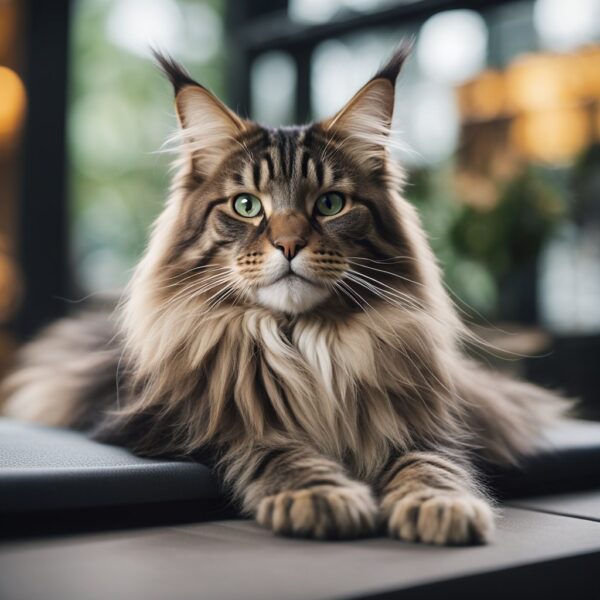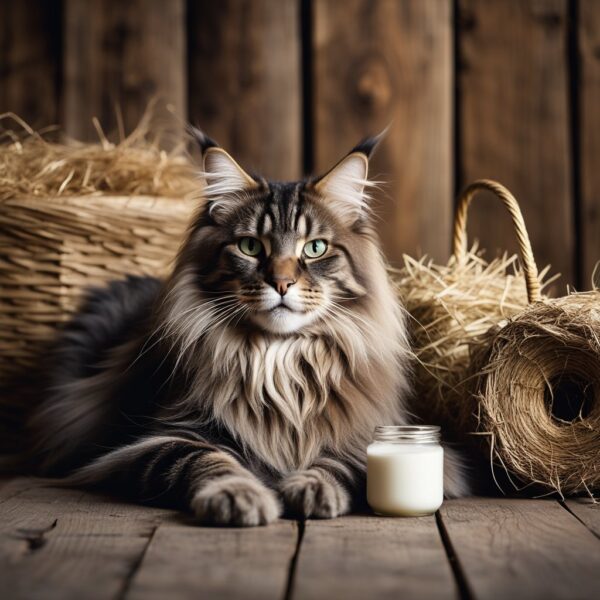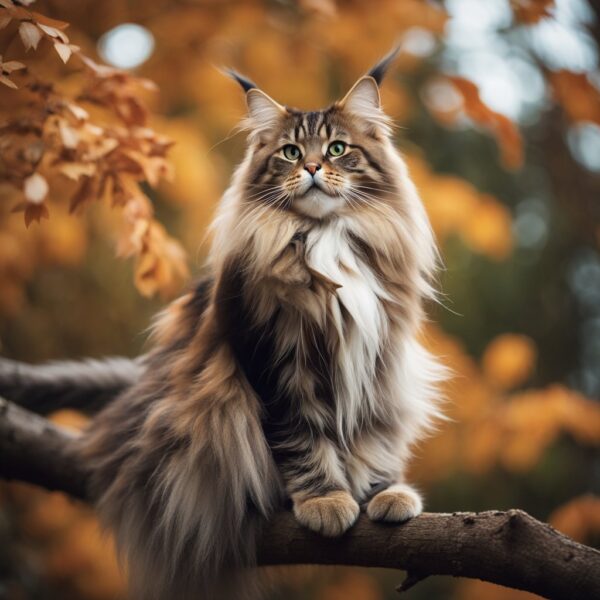
Maine Coon Cats: An Overview of Gentle Giants
The Maine Coon cat holds a distinguished position as one of the largest domesticated cat breeds, renowned for its impressive size and distinctive physical characteristics. Originating from the state of Maine, where it is also designated as the official state cat, the Maine Coon has a storied history as one of North America’s oldest natural breeds. These cats exhibit a rugged appearance with a shaggy, water-resistant coat and large tufted ears, features that likely developed as adaptations to harsh winter climates.
Known for their gentle and friendly disposition, Maine Coons are often referred to as “gentle giants” within the feline world. They are social creatures that enjoy interacting with their human families and remain playful well into adulthood. Despite their considerable size, they are known for their amiable personality and an inclination towards companionship, which makes them a favorite among cat enthusiasts.
Health and care for Maine Coon cats are important considerations due to their size and distinct traits. While they are generally healthy, they can be prone to certain genetic conditions, which makes responsible breeding practices crucial to maintaining the health and pedigree of the breed. Their thick coats require regular grooming to prevent matting and to maintain their distinctive appearance. Combining their captivating looks and charming nature, Maine Coons have cemented their place not just in homes, but also in cultural significance, often being featured in various forms of media and cat shows.
Key Takeaways
- Maine Coons are one of the oldest and largest domestic cat breeds originating from Maine.
- They have a sociable personality, often described as gentle giants, and require regular grooming.
- Responsible breeding practices are important to maintain their health and pedigree.

History and Origin
The Maine Coon cat is deeply rooted in American history with origins that involve a mix of intriguing theories and genetic mystery. Its early presence in New England and its surmised Old World connections make its ancestry a captivating topic.
Ancestry of Maine Coon Cats
The Maine Coon is commonly believed to have originated in the United States, specifically in Maine, where it is named after. Historical accounts suggest that Maine Coons are among the oldest natural breeds in North America, and their history ties back to the early 19th century. There are several theories regarding their lineage:
- Domestic Cat and Turkish Angora Crossbreeding: It’s conjectured that the distinctive fur of Maine Coon cats may be a result of interbreeding between local domestic cats and Turkish Angoras.
- Marie Antoinette’s Cats: Another tale connects these cats to the pets of Marie Antoinette, which were said to be shipped to Maine during her attempt to escape France.
- Seafaring Origins: Some posit that Maine Coons descended from European or Asian domestic cats brought over by seafarers, potentially merging with the local feline population.
Despite these hypotheses, there is no definitive evidence that conclusively links Maine Coons to either the raccoon or the bobcat, as folklore sometimes suggests. Genetically, these natural hybrids are unlikely.
Historical Popularity
Maine Coons gained significant popularity in the United States by the late 19th century. Historical highlights include:
- Early Cat Shows: Maine Coons were shown in Boston and New York in the late 1800s. One particular Maine Coon, a brown tabby male, won “Best in Show” at the 1895 New York City cat show.
- State Cat of Maine: Recognizing its significance, Maine designated the Maine Coon as the official state cat.
- Revival of Interest: Although their popularity waned with the introduction of exotic long-haired breeds from overseas, there was a resurgence of interest by the 1950s, cementing the Maine Coon’s status as a beloved pet and show cat in the modern era.
Physical Characteristics
Maine Coon Cats exhibit a striking and robust appearance that sets them apart from other breeds. They are recognized for their considerable size and weight, luxurious coat that comes in varied colors and patterns, as well as their unique physical attributes.
Size and Weight
- Average Weight: 9 to 18 pounds; males may exceed 20 pounds
- Length: Approximately 19 to 40 inches
Maine Coons are among the largest domesticated cat breeds. They possess a muscular and solid build, which contributes to their notable weight and rectangular body shape.
Coat and Colors
- Coat Texture: Heavy, shaggy, and water-resistant
- Common Colors: Include bi-color and smoke variations
Their coat is one of their most distinctive features, being thick and designed to withstand harsh climates. Maine Coons come in a variety of colors, with patterns that can range from solid colors to smoke and bi-color.
Distinctive Features
- Ears: Large with tufts at the tips
- Eyes: Large, expressive, commonly green, gold, or blue
Maine Coon Cats are easily recognizable by their tufted ears, which add to their wild appearance, and their large, expressive eyes that captivate attention. Their long, bushy tails are also notable, often resembling those of raccoons.

Personality and Behavior
Maine Coon cats are renowned for their dynamic personalities, combining a sociable attitude with a distinctive blend of affection and intelligence. They exhibit a playful nature while maintaining the calm demeanour of a gentle giant.
Temperament
Maine Coon cats are sociable creatures, enjoying the company of humans and animals alike. Their intelligence can be seen in their curiosity and the way they interact with their environment. Despite their large size, Maine Coons are often referred to as gentle giants due to their mild and friendly nature. They tend to be independent, but will still seek out companionship and affection from their owners.
- Affection: High
- Playfulness: High
- Sociability: Very sociable; enjoys companionship
Social Behavior
This breed’s social behavior mirrors their temperament. Maine Coons are typically friendly towards children and other pets, making them excellent family cats. They’re intelligent enough to adapt to various social situations. Furthermore, they are often quite vocal, with a range of meows, chirps, and trills to communicate with their owners. Maine Coon cats can be independent at times, but they often balance this with moments where they seek interactive play and affection.
- Interaction with Children: Friendly; gentle
- Interaction with Other Pets: Good; non-aggressive
- Vocalization: Highly expressive; communicative
Health and Care
Maine Coon Cats are generally hardy animals but require attentive care to prevent common genetic health issues and maintain their long, lush coats. Adherence to grooming schedules and awareness of potential health problems can ensure a happy and healthy life for these felines.
Common Health Issues
Maine Coons are predisposed to several genetic conditions. Hypertrophic cardiomyopathy (HCM) is a form of heart disease that affects many Maine Coons. Regular veterinary screenings can detect early signs of HCM. Hip dysplasia and spinal muscular atrophy are also concerns. Hip dysplasia can lead to arthritis, impacting the cat’s mobility, while spinal muscular atrophy may cause muscle atrophy without pain. Obesity is an additional risk factor for Maine Coons; it’s vital to maintain a healthy weight through proper diet and exercise.
- Common Health Issues in Maine Coons:
- Hypertrophic Cardiomyopathy
- Hip Dysplasia
- Spinal Muscular Atrophy
- Obesity
- Arthritis
Grooming and Maintenance
Regular grooming is essential to prevent matting and shedding of their heavy, shaggy coats. It’s recommended to brush a Maine Coon’s fur at least twice a week. They often enjoy the process, which also helps to strengthen the bond with their owners. Occasionally, Maine Coons may require baths but generally keep themselves clean. Dietary considerations are crucial for their coat health, requiring a diet rich in protein to maintain its silkiness.
- Grooming Essentials:
- Brushing: Minimum of twice a week
- Bathing: Occasionally, as needed
- Nutritional Needs:
- High-Protein Diet
Maine Coon owners should consult their veterinarian to establish a tailored care routine, accounting for individual health risks and grooming needs.
Breeding and Pedigree
Breeding Maine Coon Cats adheres to rigorous standards to maintain the integrity of the breed, with a focus on health, temperament, and adherence to established breed specifications. Prospective owners should be informed about the processes involved and the typical costs associated with adopting a pedigree kitten.
Maine Coon Standards
The Maine Coon Cat boasts a distinctive physical appearance and a friendly temperament that breeders aim to preserve. Recognized by the Cat Fanciers’ Association (CFA), Maine Coons have achieved championship status thanks to their unique traits. For a Maine Coon to be considered a true representative of the breed, it must:
- Exhibit a strong, rectangular body shape.
- Possess a shaggy, water-resistant coat.
- Display tufted ears, a bushy tail, and a ruff around the neck.
- Show a playful and friendly demeanor.
Health screenings for genetic diseases and ensuring genetic diversity are paramount to reduce the risk of inheritable conditions. Breeders must also ensure that kittens receive appropriate socialization to nurture their natural playfulness and prepare them for integration into family environments.
Kitten Adoption and Prices
The process of responsibly adopting Maine Coon kittens involves careful consideration from both the breeder and the prospective owner. Costs for adopting pedigree Maine Coon kittens vary, reflecting the comprehensive care they receive from birth. A Maine Coon kitten typically ranges in price from $500 to $2,500 depending on the breeder, location, and lineage.
Factors influencing the adoption fee include:
- Health screenings: Ensuring the kitten is free from hereditary conditions.
- Pedigree documentation: Authenticating the kitten’s purebred status.
- Initial care: Vaccinations, microchipping, and spay/neuter procedures.
Adopting from reputable breeders often entails entering a waiting list due to the popularity and careful breeding practices associated with Maine Coons.
Cultural Significance
The Maine Coon’s size, along with its history, has made it a notable breed in various cultural settings, particularly within the United States, where it has achieved significant recognition and popularity.
Record-Holding Maine Coons
The breed is known for having some of the largest domestic cats, with Stewie, a male Maine Coon, holding the record for the longest cat. His notable length was an astonishing 48.5 inches from the tip of his nose to the tip of his tail. Male Maine Coons are typically larger than their female counterparts, and they are often referred to as “gentle giants” due to their large size coupled with their friendly and placid nature.
Maine Coons in the Show Circuit
Maine Coon cats have historically been a centerpiece in cat shows across North America, from local competitions like the Maine State Champion Coon Cat contest at the Skowhegan Fair to larger events in cities such as Boston. Their popularity in the show circuit is not only due to their impressive physical attributes but also because of their long-haired coats, which can come in various colors and patterns. Furthermore, Maine Coons are often celebrated for their balance of having a wild appearance, reminiscent of a raccoon, and the temperament of a domestic cat, making them fascinating participants and winners in many cat shows.
Frequently Asked Questions
In this section, a reader can find concise answers to some of the most common inquiries regarding the Maine Coon cat breed.
What physical characteristics distinguish a Maine Coon cat from other breeds?
Maine Coon cats are identifiable by their long, bushy tails, prominent tufted ears, and expressive eyes. Their massive size paired with a luxurious shaggy coat adds to their distinct look among cat breeds.
How large does a Maine Coon cat typically grow?
An adult Maine Coon can weigh between 13 to 18 pounds for females and 15 to 25 pounds for males. They may reach lengths of up to 40 inches from the tip of the nose to the tip of the tail.
What is the average lifespan of a Maine Coon cat?
Maine Coon cats generally live from 12 to 15 years. Some can live longer with proper care, a good diet, and regular veterinary attention.
Are Maine Coon cats considered good companions for indoor living?
Yes, Maine Coon cats adapt well to indoor living. They are known for their friendly nature and can be excellent companions, typically getting along well with other pets and family members.
How much maintenance and care do Maine Coon cats typically require?
Their coat needs weekly combing to prevent matting and to reduce shedding. Other than grooming, Maine Coon cats require standard care such as regular vet check-ups, vaccinations, and a balanced diet.
What factors contribute to the higher price point of Maine Coon cats?
Maine Coon cats often come with a higher price tag due to factors such as their purebred status, breeding costs, popularity, and the breeders’ care investment in health screenings and proper socialization.